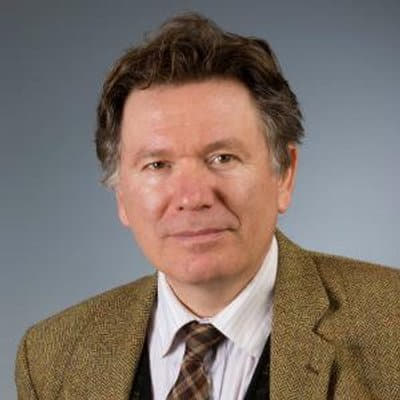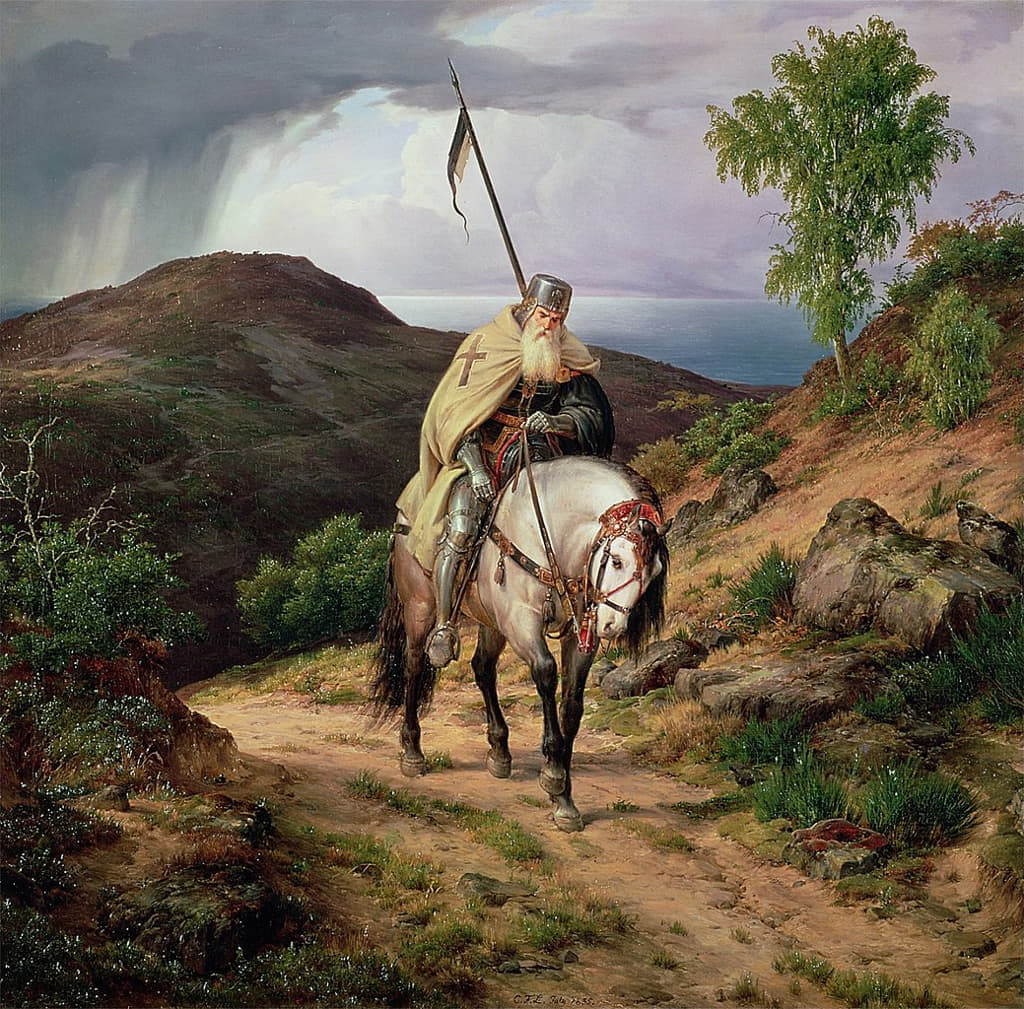A former student at the prestigious École Normale Supérieure, Henri Hude was Professor of Philosophy at the French Saint-Cyr Military Academy. (Saint-Cyr). His latest book, A Philosophy of War, is a call for religions to take a philosophical and spiritual leap forward in building peace for the world of tomorrow.
[This interview was conducted by Omnes Magazine, through whose kind generosity we are able to bring you this English version].
Omnes Magazine (OM): Faced with the risk of total war, can we sum up your approach in your latest book, A Philosophy of War, by saying that religions are the solution, not the problem, to achieving universal peace?
Henri Hude (HH): Total war requires the use of all available means. Today, it would lead to the destruction of the human race, thanks to technical progress. The terrifying possibility of such destruction gives rise to the project of eliminating war as a condition for the survival of humankind. But war is a duel between several powers. So, to eliminate war radically, there is the need to institute a single World Power, a universal Leviathan, endowed with unlimited power.

But plurality can always be reborn: through secession, revolution, mafias, terrorism and so on. To make the world safe, there is the call to destroy all powers other than that of the Leviathan. Not only must we put an end to the plurality of political and social powers, but we must also destroy all other powers: spiritual, intellectual and moral. We are far beyond a simple project of universal imperialism. It is about supermen dominating subhumans. This Orwellian-Nazi project is so monstrous that it has a paradoxical consequence. The universal Leviathan becomes common enemy number 1 of all nations, religions and wisdoms. Previously, these were often at war or in tension. Now, thanks to the Leviathan, they are allies, friends, perhaps. The Leviathan is incapable of guaranteeing peace, but his monstrosity, now forever a permanent possibility, guarantees the lasting alliance of former enemies. Religions and wisdoms are the primary guarantee of freedom and peace. This is another world.
OM: The Holy See’s diplomacy seeks to establish a solid dialogue with Islam in order to build “bridges.” In recent history, Cardinal Jean-Louis Tauran worked to this end by visiting Saudi Arabia, a first for a Holy See diplomat of such rank. In 2019, the emblematic meeting between Pope Francis and Ahmed Al-Tayeb, Imam of the Al-Azhar mosque, the most important Sunni institution in the Middle East, also marked a further step in this rapprochement (not to mention the successive trip to Bahrain). Do you think this diplomatic policy is a step in the right direction?
HH: I think so, because it is part of this logic of peace through an anti-Leviathan alliance. For who is the Leviathan? Certainly, to become the Leviathan is forever the temptation of every power in this world. The Leviathan is therefore first and foremost a fundamental concept of political science. But it also has a terrible application in the political and cultural choices made by Western elites, especially Anglo-Saxon ones. The Woke is a machine for manufacturing sub-humans. Democracy is transformed into plutocracy, freedom of the press into propaganda, the economy into a casino, the liberal state into a police state, and so on. Such imperialism is both odious and dysfunctional. It has no chance of success, except in the old, more controlled Western countries—and even then… The Pope is right to prepare for the future.
As far as Muslims in particular are concerned, the Leviathan’s strategy is to push the most violent and sectarian everywhere, who are its useful idiots, or its stipendiary agents, in order to divide and rule. Muslim religious leaders, who are as intelligent as the Pope, know this very well. Political leaders know it, too. See how they are taking advantage of NATO’s failures in Ukraine to take their freedom from the Leviathan. It is not at all a question of creating a single syncretic religion, because cheap relativism is the first principle of the sub-human culture that the Leviathan wants to inject into everyone in order to dominate everything dictatorially. It is all about finding a modus vivendi. It is about friendship and friendly conversation between people who are sincerely seeking God, not pseudo “interfaith dialogue” between modernist, relativist clerics or intellectual laymen, guilt-ridden to the hilt by the Leviathan.
OM: In the conflict between Russia and Ukraine, do the links between the Patriarch of Moscow and the authorities, or similar links in Ukraine and internal religions, make it almost impossible for religions to join forces to build peace?
HH: If you want to criticize others, you have to start by putting your own house in order. We might ask ourselves, for example, if we French Catholics do not have an ambiguous relationship with political power. In the face of Woke dogmatism, the canonization of the culture of death, invasive authoritarianism, servility to the Leviathan, the march to world war, we remain as if KO standing. Manipulated and/or careerist, we sometimes wade into guilt, asking forgiveness for existing in the public sphere.
If the Woke culture were to be universally imposed, it would be the loss of all souls and the end of all decent civilization. Resistance to the imposition of Woke culture can be a just cause of war. That is what the whole world thinks, except the West, and that is why Western soft power is evaporating so fast. This is without prejudice to the justice due to Ukraine and charity among Catholics.
OM: Is violence inherent to Islam?
HH: I would like to ask you, is cowardice inherent to Christianity? Christ said he had not come to bring peace on earth, but division. He also said that he spewed out the lukewarm. In many a Sunday sermon, there would be nothing to change if we replaced the word “God” with “Teddy Bear.”
In his book, Ecumenical Jihad, Peter Kreeft (pp. 41-42) writes: “…it took a Muslim student in my class at Boston College to berate the Catholics for taking down their crucifixes. ‘We don’t have images of that man, as you do,’ he said, ‘but if we did, we would never take them down, even if someone tried to force us to. We revere that man, and we would die for his honor. But you are so ashamed of him that you take him down from your walls. You are more afraid of what his enemies might think if you kept your crucifixes up than of what he might think if you took them down. So I think we are better Christians than you are.’”
We call blushing for Christ respect for freedom. We believe we have opened up to the world, when in fact we have abdicated all evangelical freedom. We believe we are superior to our elders, when all we are doing is participating in this lamentable evolution, which Solzhenitsyn called the “decline of courage.” To be a Christian, you must first not be a sub-human. And in order not to be sub-human, you have to be capable of resisting the Leviathan. If need be, by spilling his blood. Bismarck put thirty bishops in prison, and in the end had to abandon the Kulturkampf.
OM: Ten years ago, Pope Francis said: “True Islam and a proper interpretation of the Koran are opposed to all violence.” This phrase continues to provoke debate and divide Islamologists and theologians. What did Francis mean?
HH: I do not know what the Pope meant. The expressions “true Islam” and “proper interpretation” pose formidable problems, so the phrase can take on very different meanings. In the absence of precision, there is no way of knowing. The philosopher Rémi Brague, who knows the subject admirably, has just written a book entitled, Sur l’Islam, in which he displays a truly confounding erudition. He believes he must interpret the sentence as if the Pope were speaking as a historian of ideas. He proves that, if this were the case, this assertion would be wrong. But I do not think the Pope is speaking as a historian of ideas. (In any case, these are subjects to which the Petrine charism of infallibility does not apply).
OM: Should we understand the Pope’s statement as primarily political, confronting Muslim authorities with their contradictions and responsibilities, and inviting them to join him in building a world of peace?
HH: The Pope is no more Machiavellian than he is ignorant. In truth, we need to distinguish between force and violence. Violence is the illegitimate use of force. All the great religions and wisdoms are opposed to all violence, but none is opposed to all use of force. Every society has the right to self-defense. If the use of armed force were morally forbidden to any society in all circumstances, it would be morally obligatory to endure any aggression, by anyone, for any purpose. In other words, it would be morally obligatory to obey even those perverts who would destroy every moral principle. Societies therefore have a right, and sometimes a duty, to self-defense, armed if necessary. Some abusers understand no language but force. So, you draw a red line on the ground in front of them. “This line means that I would rather risk my life and suffer than undergo what you want to impose on me. If, therefore, you transgress this line, you will have to risk your life and suffer.” If you are incapable of this behavior, you are good for slavery.
Featured: The Return of the Crusader, by Karl Friedrich Lessing; painted in 1835.

